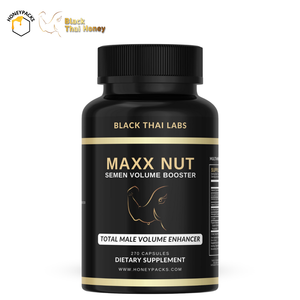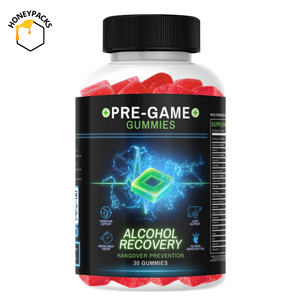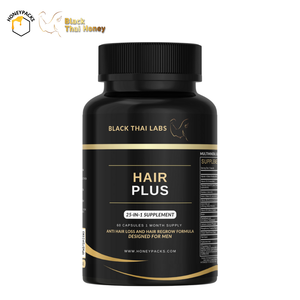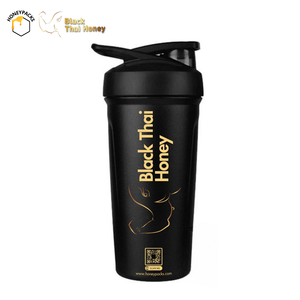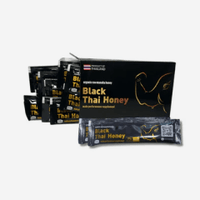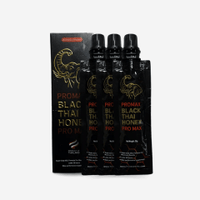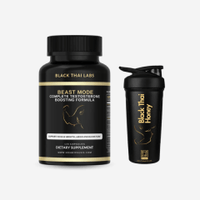Do Honey Packs Expire?
Do honey packs expire? Not exactly. Honey itself doesn’t spoil, but packaging, storage, and added ingredients can affect quality.
Learn how to store it, what “best before” really means, and whether hardened or expired honey is still safe to consume.
Do honey packs expire? Technically, no. Honey is one of nature’s most shelf-stable substances. Thanks to its low moisture content, natural acidity, and powerful antimicrobial properties, pure honey can last for decades without spoiling.
In fact, archaeologists have uncovered 3,000-year-old jars of honey in Egyptian tombs that are still perfectly edible.
So why does your Honey Pack have a “best before” date?
It’s not because the honey itself goes bad.
It’s because other factors, like the addition of active ingredients (think black ginger, ginseng, or Butea Superba), soft plastic packaging, or exposure to heat, can affect taste, potency, and texture over time.
Unlike regular table honey, Honey Packs are a functional product with real-time performance benefits. That means freshness matters.
If you’re wondering how to store them, whether you can still use a hardened pack, or what to do with an expired one, this guide breaks it all down.
We’ll even cover the difference between expiration and potency loss, and why the packaging might be more important than the honey inside.
Want the full breakdown? Keep reading, we’ve got answers.
Do Honey Packs Expire? What to Know About Shelf Life, Storage, and Safety
If you've found a Honey Pack in your drawer and the date has passed, you might be wondering, is this still safe to take?
While honey itself is famously resistant to spoilage, the answer isn't as straightforward when it comes to functional honey blends like Black Thai Honey.
In this guide, we'll explain why honey doesn’t expire in the traditional sense, what the “best before” label really means, and how additional ingredients and packaging affect shelf life.
You’ll also learn the best way to store your Honey Packs, how to handle crystallized or hardened honey, and when it’s time to toss a pack for good.
Let’s clear up the myths and give you the facts, so you can enjoy your Honey Packs with confidence, even if the date’s a little dusty.
The Eternal Shelf Life of Real Honey
Honey is one of the only natural foods on Earth that doesn’t spoil. That’s not hype, it’s chemistry.
Real honey has incredibly low moisture content and a naturally acidic pH, which makes it an environment where bacteria, mold, and yeast simply can’t survive. Unlike most foods, honey is self-preserving.
This isn’t just theory. Archeologists discovered jars of honey in ancient Egyptian tombs that were over 3,000 years old, and still perfectly edible.
That’s not only impressive, it’s a testament to the natural shelf-stability of pure, unprocessed honey.
Its secret lies in more than just sugar. Raw honey also contains trace amounts of hydrogen peroxide and other antimicrobial compounds created by bees during the honey-making process.
These natural properties give honey powerful antibacterial and antifungal resistance, making spoilage nearly impossible if it’s stored properly.
This is why honey doesn’t need preservatives, artificial additives, or refrigeration to stay fresh.
It’s nature’s original superfood and preservative all in one. So when we talk about shelf life in a Honey Pack, we’re not worried about the honey going bad, we’re looking at what else is in the pack, and how it's stored.
Why Honey Packs Still Have an Expiration Date
If honey lasts forever, why does your Honey Pack come stamped with a “best before” date? The answer has more to do with performance and packaging than spoilage.
“Best Before” vs. Expiration
First, understand this: a “best before” date is not an expiration date. It doesn’t mean the product becomes unsafe, it signals when it’s likely to be at peak quality.
After that point, the taste, texture, or potency of added ingredients may begin to fade, but the product isn’t suddenly harmful.
Regulatory Standards Require It
Per FDA regulations, all consumable packaged goods must carry a date for inventory tracking and consumer clarity.
This isn’t about spoilage, it’s about standardization. Even with honey’s incredible resilience, the law still applies.
Added Ingredients Change the Game
While pure honey is nearly immortal, most Honey Packs, like our Black Thai Honey, contain functional ingredients like black ginger, ginseng, Butea Superba, and vitamin C. These botanicals are potent, but they’re also more sensitive to time, heat, and oxidation. Over time, they may lose their effectiveness, making your Honey Pack less powerful even if the honey itself is still intact.
Packaging Material Matters
Unlike glass jars used for long-term honey storage, most Honey Packs use flexible, discreet plastic packs for portability. This convenience comes with trade-offs.
Over time, plastics can degrade, especially when exposed to heat, potentially leaching microplastics or allowing in tiny amounts of oxygen that slowly impact the pack’s contents.
That’s why shelf life on Honey Packs has more to do with packaging than the honey inside.
In short, the date is there for your benefit, not because the product will “go bad,” but because we want you to experience it the way it was intended: fresh, potent, and powerful.
How Packaging Affects Longevity
Honey may not expire, but the packaging it's in definitely can. And when it comes to Honey Packs, the container plays a bigger role than you might think in determining long-term quality.
The Plastic Problem: Microplastics Over Time
Most honey packs are made from flexible plastic packs for ease of use and discreet portability. But plastic isn’t designed for eternity.
Over time, especially when stored in warm or fluctuating temperatures, plastic materials can begin to break down and release microplastics into the honey.
This is especially concerning for packs left in hot environments like glove compartments or gym bags. While it won’t make the honey unsafe immediately, it can subtly affect purity and flavor.
Oxidation and Light Exposure
Soft packaging can also make honey more vulnerable to air and light exposure.
Unlike dark glass jars that block UV rays and seal tight against oxygen, thin packs can allow slow seepage of light and air over time.
Even tiny exposures can degrade the botanical ingredients inside, reducing the effectiveness of herbs like black ginger and ginseng, which are sensitive to oxidation.
Heat Sensitivity and Potency Loss
High heat is the enemy of potency.
The active herbal extracts in Honey Packs, designed to support stamina, blood flow, and testosterone, can lose their edge if exposed to excessive temperatures.
That’s why you should never leave Honey Packs in a hot car, windowsill, or anywhere they might be subjected to direct sunlight or heat spikes.
Seal It Tight or Pay the Price
Finally, proper sealing is non-negotiable.
If a Honey Pack is partially used and not fully resealed (or if it’s been bitten open directly), even a small amount of air or moisture can trigger fermentation or mold.
Always check for leaks, bloating, or strange smells before consuming an older pack.
Packaging dictates how long your Honey Pack will maintain peak power. Store smart, and your packs will be ready whenever you are.
How to Store Honey Packs for Maximum Freshness
When it comes to preserving the potency of your Honey Packs, storage is everything.
While the honey itself can withstand time, the herbal ingredients and packaging are far more sensitive. Here's how to get the longest life, and best performance, from every pack.
Cool, Dry, and Out of the Light
The ideal environment for storing Honey Packs is cool, dry, and dark.
Think pantry, drawer, or cabinet, anywhere away from sunlight, moisture, or major temperature swings.
Unlike some supplements, Honey Packs don’t need to be refrigerated. In fact, refrigeration can speed up crystallization and change the texture unnecessarily.
Keep Away from Heat Sources
Heat is the quickest way to ruin a good pack.
Leaving Honey Packs in your car, on a sunny windowsill, or near appliances can degrade the herbal extracts inside.
Even if the honey looks fine, high temps can reduce the effectiveness of ingredients like black ginger and Butea Superba, compromising the benefits you expect.
Want Extra Insurance? Use Glass
If you're serious about long-term storage, consider transferring Honey Pack contents into a small glass jar with an airtight lid.
Glass is chemically stable, blocks light, and doesn’t leach, making it ideal for maintaining freshness. Just make sure to store it in a dry, dark place and use a clean utensil each time to avoid contamination.
Unopened = Untouched
Finally, shelf life is maximized when the pack is left sealed and unopened.
As long as the packaging hasn’t been punctured or exposed to extreme conditions, most Honey Packs stay fresh for 18–24 months or longer.
Once opened, aim to use the contents within a few days and avoid double-dipping or letting moisture inside.
Proper storage isn’t just about keeping your honey sweet, it’s about ensuring every pack delivers the full effect. Treat them right, and they’ll be ready whenever you are.
Is Hardened or Crystallized Honey Still Safe?
Finding a hardened or grainy Honey Pack might make you pause, but don’t worry.
Crystallization is a completely natural process and not a sign that your honey has gone bad.
Crystallization ≠ Spoilage
Honey is made up of natural sugars, and over time, especially in cooler temperatures, those sugars can separate and form crystals.
This doesn't mean the honey is spoiled or unsafe to consume.
In fact, crystallization is often a sign that your honey is raw and minimally processed. It still holds all its antimicrobial and antifungal properties, along with the full spectrum of nutrients.
Reheat Gently, Restore Easily
If you'd rather your Honey Pack return to its smooth, liquid form, gentle warmth is the quick solution.
Drop the unopened pack in a bowl of warm (not boiling) water for a few minutes. This softens the crystals without destroying any of the active herbal compounds inside.
Never microwave a honey pack, especially not in its plastic wrapper, as this can degrade both the packaging and the product.
Still Potent, Still Delicious
Even in crystallized form, the honey retains its flavor, energy-boosting sugars, and performance-enhancing ingredients.
While the texture may change, the core benefits remain intact, whether you're using it for energy, stamina, or a sharper, more confident performance in bed.
So if your Honey Pack feels a little firm, don’t toss it. Crystallization is just a natural shift, not a red flag. A quick warm-up, and you’re good to go.
What Happens If You Consume Expired Honey Packs?
So you found a Honey Pack past its “best before” date, should you take the risk? In most cases, that’s the wise think to do… but with a few important caveats.
Taste and Texture May Fade
First things first: consuming an expired Honey Pack isn’t inherently dangerous.
The honey itself won’t spoil thanks to its natural antimicrobial properties. However, you might notice a change in taste or consistency.
The honey could become thicker, grainier, or slightly dull in flavor, especially if it’s been stored in poor conditions.
Potency Loss in Herbal Ingredients
What’s more likely to “expire” is the effectiveness of the herbal extracts inside.
Over time, active compounds in black ginger, ginseng, Butea Superba, and other supplements can degrade, especially if the pack has been exposed to heat, light, or oxygen.
That means the performance benefits you count on may be diminished, even if the product still tastes fine.
Watch for Contamination (Rare, But Possible)
While spoilage is rare in a sealed Honey Pack, it’s not impossible.
If moisture or air somehow entered the pack, say, from improper sealing or packaging damage; mold or fermentation could occur.
Signs include bubbling, a sour or off-putting smell, visible separation, or leakage.
When to Toss It
Here’s a simple rule: if the pack smells weird, leaks, has visible mold, or feels bloated or overly sticky on the outside, throw it out.
No enhancement is worth gambling with a spoiled product. But if the pack looks normal, smells sweet, and hasn’t been opened, it’s probably just aged, not expired.
Remember, “best before” doesn’t mean “bad after.” But for peak performance, potency, and taste, it’s always best to use Honey Packs within their intended window, especially if you’re looking to bring your A-game on date night.
Final Take: Honey Packs Don’t Expire, But They Do Age
Honey is one of the most naturally preserved substances on earth.
It’s self-sustaining, shelf-stable, and practically eternal. But once you add potent herbs, tuck it into a portable pouch, and expose it to the real world, time starts to matter.
It’s Not the Honey, It’s the Packaging
The raw honey inside your pack is still doing its thing: resisting mold, warding off bacteria, and staying sweet.
But it’s the packaging, and the powerful natural additives like black ginger, ginseng, and Butea Superba, that are vulnerable.
Plastic can degrade. Botanicals can lose their punch. That “best before” stamp isn’t a scare tactic, it’s a guide for peak performance.
Trust the Pack, But Trust Your Senses More
At Honey Packs, we’re all about transparency. We don’t cut corners, hide ingredients, or make hollow claims.
So if your pack looks sealed, smells sweet, and hasn’t been through a heatwave? You’re likely good to go.
When in doubt, your senses will tell you everything you need to know: if it smells off, leaks, or looks weird, toss it.
Smart Storage, Strong Results
Keep your packs in a cool, dark place. Skip the fridge, avoid hot cars, and don’t bite open a pack unless you plan to finish it.
That’s how you preserve every drop of power and keep your performance locked in.
Black Thai Honey: Trustworthy Ingredients, No Games
We built Black Thai Honey for guys who want lasting results, with no synthetic shortcuts.
Our packs combine time-tested herbs with raw honey and honest science. They’re made to perform, to last, and to support the strongest version of you.
So yes, Honey Packs don’t expire. But they do age. And if you treat them right, they’ll be ready when it counts. Stay sharp. Stay ready. Store smart.
Questions Answered
Let’s tackle the most common questions guys have about Honey Packs and expiration, storage, and safety.
Do Honey Packs Need to Be Refrigerated?
No. In fact, refrigeration can speed up crystallization and alter the texture unnecessarily.
Your Honey Packs are best stored at room temperature in a cool, dark, dry place, like a drawer or pantry.
What’s the Shelf Life of a Typical Honey Pack?
Typically 18–24 months, depending on storage conditions and the added ingredients.
While the honey itself doesn’t spoil, herbal extracts like ginseng or black ginger can lose potency over time, especially if exposed to heat or air.
Can I Eat a Honey Pack Past Its Best Before Date?
Yes, if it smells, looks, and tastes normal.
The “best before” date is about quality, not safety.
Just check for any signs of
-
Leakage
-
mold
-
sour odor.
If it passes the sniff test, you’re good to go, though effects may be milder.
Is It Safe to Use Crystallized Honey Packs?
Definitely. Crystallization is a natural process that happens when the sugars in honey solidify over time, especially in cooler environments.
It doesn't affect safety or core benefits and can be reversed with gentle warming.
What’s the Best Way to Reheat Hardened Honey?
Warm it slowly in hot (not boiling) water.
Just drop the unopened Honey Pack into a cup of warm water for a few minutes.
Never microwave it, especially not in the plastic wrapper, as high heat can damage both the packaging and active ingredients..
